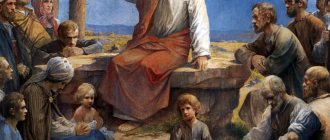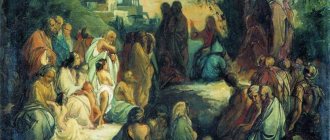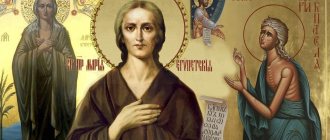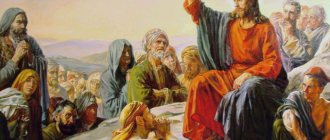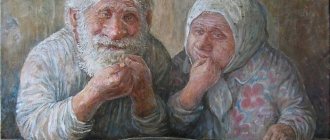"They will inherit the kingdom"
At the dawn of the formation of the nation of Israel, the Jews were given a promise
5. Therefore, if you will obey My voice and keep My covenant , then you will be My possession above all nations, for all the earth is Mine, 6. And you will be to Me a kingdom of priests and a holy nation ; These are the words that you will speak to the children of Israel (Exodus 19:5,6)
The prophet Daniel also wrote about the kingdom of priests
44. And in the days of those kingdoms, the God of heaven will erect a kingdom that will never be destroyed, and this kingdom will not be transferred to another people; it will crush and destroy all kingdoms, but it will stand forever...(Daniel 2:44)
It was about this kingdom that Jesus Christ taught when he came to earth. And he did not mean earthly government, but heavenly reward.
6. Blessed and holy is he who has part in the first resurrection: the second death has no power over them, but they will be priests of God and Christ and will reign with Him for a thousand years. (Revelation of John the Evangelist 20:6)
Orthodox Life
Interpretation of Metropolitan Anthony (Pakanich), rector of the Kyiv Theological Academy and Seminary, on the Beatitudes. Part 1.
Sermon on the Mount. Painting by Heinrich Bloch. Fragment
– Master, are the Beatitudes the commandments of true happiness on earth? When did people receive them and in what quantity?
– God’s boundless love for man was expressed in the fact that He did not abandon His creation even after the fall of the first parents. Moreover, He inevitably continued to take care of the salvation of the human race, providing people with moral forces and divine institutions, which, like a lighthouse, guided man in the storm of the sea of \u200b\u200blife. Having given people the internal law of conscience, God supplemented it as needed with an external law - Revelation. The need for a frank law was revealed when, as a result of the Fall, man’s moral consciousness was dulled and distorted. That is why the Apostle Paul says that “the law was given because of transgressions” (Gal. 3:19), that is, because of the Fall. The conscience of man was eclipsed and distorted - and to its aid the Ten Commandments were given, in which the will of God is clearly expressed. These Commandments were received by the prophet Moses on two clay tablets on Mount Sinai, and therefore they are also called the Sinai legislation.
Over many centuries of Old Testament history, the essence and meaning of the moral revelation expressed in the Sinai commandments were buried under the weight of a huge variety of everyday and ritual prescriptions. The scrupulous execution of the purely external, ritual aspect of the law began to be given paramount importance. Therefore, the Lord had to appear in order to renew the content of the law and fill it with inner spiritual meaning.
Our Lord Jesus Christ continued to build on the foundation that was laid in ancient times by the prophets: “Do not think that I came to destroy the law or the prophets: I did not come to destroy, but to fulfill” (Matthew 5:17). But His building is more perfect - He fulfilled and at the same time completed the law. The Lord reduces the commandments given through Moses to the law of conscience and heart. As a result, they are no longer written on tablets of stone, but on tablets of the heart (Rom. 8:10). Thus, the Savior raises our thought from earthly and temporary blessings, which prompted the Israelites to fulfill the law, to incorruptible and eternal blessings, directing the Christian’s thought to Heaven as the goal of his existence.
Our Lord Jesus Christ revealed the Beatitudes in the Sermon on the Mount. There are nine of them (see Matt. 5:3–12). They talk about what a person should do, what he should be, in order to find happiness and fullness of life. Bliss is synonymous with happiness. Saint Gregory of Nyssa defines beatitude as follows: “Bliss is the totality and completeness of everything that is good and that is desired as good, without a single lack, deprivation or obstacle. The followers of Christ not only expect bliss as the future, but it is inherent in their soul as the present, since Christ himself is present in them.” In other words, bliss is that inner, unemotional joy that a person gains in this life and which passes with him into eternity.
– The first beatitude: “Blessed are the poor in spirit, for among them is the Kingdom of Heaven.” Who are the poor in spirit and why does the Kingdom of Heaven belong to them?
– Life with God is the fullness of being, the highest good and human happiness. But in order for a person to find happiness, he must be able to accept the Spirit of God into himself, freeing his heart from sins and passions. Sin drives God out of people’s lives, and then the person’s own “I” reigns in the central place of their spiritual life that belonged to Him. There is a distortion of life values, a change in all guidelines. Instead of ascending to God, serving Him and being in saving communion with Him, a person directs all his strength to satisfying the needs of his own egoism. The state when people live for themselves and place their own “I” as the center of their inner universe is called pride. Pride is the beginning of sin, because a proud person relies only on himself in life. He believes that he can do everything himself and he doesn’t need God. Pride is the beginning of the denial of God and even the struggle with Him, and spiritual poverty, or humility, is the opposite state of pride. It is no coincidence that the Word of God warns us that “God resists the proud, but gives grace to the humble” (James 4:6).
The Holy Fathers teach that the first sign of recovery of the soul is the vision of one’s sins, as countless as the sand of the sea. Awareness of one's fallen state leads a person to humility, which is naturally the first step on the path to God. Saint Nicholas of Serbia writes: “Our human poverty is very deep and hidden, so that many do not reach its bottom. But good for those who go down to the very bottom. Poverty of spirit is not some gift received from the outside, but it is a real state of a person that only needs to be realized. And they come to the realization of their spiritual poverty by severely testing themselves. Whoever decides to do this comes to understand threefold poverty: poverty from the point of view of one’s knowledge, poverty from the point of view of one’s kindness, poverty from the point of view of one’s deeds.”
Spiritual poverty and humility are not weakness, but great strength. This is a person’s victory over himself, over the demon of egoism and the omnipotence of passions. We are required to be able to see our shortcomings in order to fight them and open our hearts to God, so that He reigns in it, sanctifying and transforming our lives with His grace.
- The second beatitude: “Blessed are those who mourn, for they will be comforted.” It is very difficult for people to understand this commandment. Those who cry are always unhappy. What saving tears are they talking about?
– Indeed, according to the words of St. John Chrysostom, this commandment seems to contradict the opinion of the entire universe, because everyone considers those who cry to be unhappy. In the ordinary mind, tears are an indispensable sign of human grief, pain, resentment, and hopelessness. But those who weep blissfully are not those who cry because of everyday problems, because powerless anger, humiliated pride, and wounded pride also cry. This “sadness of this world” often leads to the mortal sin of despondency and despair. But if a person is able to cry out of compassion for his brother, then this indicates a very special state of his soul. The heart of such a person is alive, and therefore responsive to the pain of his neighbor and, therefore, capable of deeds of kindness and compassion. Charity and willingness to help others are the most important components of human happiness. For a person cannot be happy when someone nearby is suffering, just as there is no joy in the midst of ashes, victims and human grief. Therefore, our tears are a direct and morally healthy response to the grief of another person, because indifference is passive participation in lawlessness. To the best of our ability and ability, using word or deed, consolation, any participation in the life of a suffering person, changing his fate for the better, we fulfill this commandment. In essence, this commandment is aimed at ensuring that there are fewer suffering and crying among us. After all, if every person empathizes with the grief of his neighbor, figuratively speaking, weeps about this grief, and is puzzled by the goal of helping him, then there will be no mourners left.
Also, the holy fathers understood by mourners people who mourn their sins and the break with God. Saint Gregory the Theologian said that those who cry are those who regret the lost spiritual state as a result of a sin committed. The holy fathers called such sadness according to God joyful, for it does not fall as a heavy burden on the soul, but encourages a person to seek God and find consolation in Him.
- The third beatitude sounds like this: “Blessed are the meek, for they will inherit the earth.” What is the definition of meekness? And why are the meek blessed immediately after those who weep?
– Meekness is a person’s ability to understand and forgive another. It is the result of humility. And humility, as we said earlier, is characterized by the ability to put God or another person at the center of one’s life. A humble person, poor in spirit, is ready to understand and forgive. Meekness is also patience and generosity. “Why are the meek blessed immediately after those who mourn? Because meekness is the fruit and consequence of contrition and mourning for our sins, writes Archimandrite John (Krestyankin). – Most of all, we seek peace of mind in the world, but we do not have it to such an extent, because this peace is the fruit of meekness and kindness. “...Learn from Me that I am meek and lowly in heart, and you will find rest for your souls” (Matthew 11:29).” You can imagine what our lives would be like if we were all able to accept, understand and forgive each other. Heaven would have begun already on Earth. Therefore, St. Basil the Great teaches: “Meekness is the greatest of the virtues and therefore is numbered among the beatitudes... for the meek will “inherit the earth” (Matthew 5:5). This land is the Heavenly Jerusalem, it is not a spoil for those who compete, but is given as an inheritance to the long-suffering and meek.”
Interviewed by Natalya Goroshkova
Poor in spirit
To enter the Heavenly Kingdom, you must have poverty of spirit. What is it? And how poverty can be a positive sign. After all, if we want to praise a person for his developed inner world, we would rather say that he is spiritually rich. But the bad, as a rule, is called feeble-minded.
In fact, there is no contradiction here. Remember that the coming of Jesus was compared to the shining of a great light, meaning the truth and righteousness that it brought. Accordingly, before this people were in darkness.
This idea is confirmed by the allegorical prophecy of Isaiah.
5. Then the eyes of the blind will be opened, and the ears of the deaf will be unstopped. (Isaiah 35:5)
Of course, first of all, spiritual blindness was meant. And in general, absolutely all people were blind. But in different ways. The Pharisees and Sadducees, on the contrary, considered themselves very knowledgeable and understanding of the Law. But in fact, they were evil and twisted God's word, replacing it with traditions.
But there were also those who were aware of the surrounding injustice and disorder that was happening in Israel. Unable to do anything, to radically change the situation, they still strived in every possible way for truth and righteousness. They were internally poor, but they were beggars, i.e. realized their poverty and this prompted them to seek spiritual riches. (The Pharisees, as you understand, did not need to look for anything; they were rich in their own eyes).
Consequences of Ingratitude
We won’t talk too much about it either. Here are a few chains that will demonstrate the logic, think of the rest yourself:
- Anyone who has shelter and income is afraid of losing it. He is afraid of robbers, wars, economic crises and more.
- A healthy person thinks with hostility about possible illnesses.
- He who has parents, family, and friends fears betrayal and death.
- Those who work and realize their talents are afraid of losing their place or chance.
This list can also be continued indefinitely. We took as an example only the most common things. Just the next time you think about what “blessed are the poor in spirit” means, remember the gifts of the Lord. There are people who are unlucky. They do not have health, or talent, or a peaceful sky above their heads. Do they all complain?
Whoever is thirsty, come and drink
The source of power that can rebuild a person’s inner world is the Holy Spirit.
13. When He, the Spirit of truth, comes, He will guide you into all truth. (Holy Gospel of John 16:13)
And therefore Jesus, turning to all those who were seeking, thirsting, and poor in spirit, called on them to find this power by coming to him.
37. On the last great day of the feast Jesus stood and cried, saying: If anyone thirsts, let him come to Me and drink.39. This He said about the Spirit, which those who believed on Him were about to receive: for the Holy Spirit was not yet on them, because Jesus was not yet glorified. (Holy Gospel of John 7:37,39)
This call sounded to all the descendants of Abraham. And it is logical to assume that the scribes and Pharisees, well-read people, should have been the very first to recognize Jesus as the messiah. But they were not poor in spirit. For them, religion was only a way to assert themselves in society, a tool for increasing social status and position. They accepted false interpretations of the Law on faith and were too lazy to lift a finger to examine it themselves. Why, if you might be considered an outcast? Isn’t it better not to stand out and be held in high esteem and in office?
But Solomon warned.
3. if you call on knowledge and appeal to reason;4. if you search for it like silver and search for it like treasure,5. then you will understand the fear of the Lord and find the knowledge of God. (Proverbs 2:3-5)
And another parable says that
12. The ear that hears and the eye that sees—the Lord created both. (Proverbs 20:12)
Naturally, the amazing blindness of the Pharisees was also from God, who did not open their minds to understanding. He didn't give me ears or eyes. Thus the proud spiritual teachers cursed themselves, just as Daniel had predicted.
10 And none of the wicked will understand this, but the wise will understand. (Daniel 12:10)
About spirituality
Have you ever thought about the direction in which our society is developing? If in past centuries people considered value mainly in material goods, now talents have become more valuable. Those who know how to generate knowledge and transfer it to others prosper. To them, too, Jesus said: “Blessed are the poor in spirit...” This phrase is intended so that the genius does not value his abilities above communication with the Lord. Our skills and abilities are capital; this is instilled in us from childhood. There is nothing wrong with this as long as it is not used to harm others. After all, the Lord grants the ability so that his children can improve the earth and develop this space. It is important not to feel proud because you can and have more than others. The sin lies in contempt for those who are deprived of talents. This applies to any abilities, including spiritual ones. There are people with incredible wisdom who know how to lead others. They have to constantly fight the temptation of pride. To be able to maintain faith in the Lord is what it means “blessed are the poor in spirit.” We must constantly remember: there is nothing more valuable than unity with the Almighty. Feeling it within yourself is the fulfillment of covenants. And those who are together with the Lord are protected from temptations, including from pride.
The wise will understand
The wise will understand - prophetically indicates the blessing of the Holy Spirit on all who are sincere and pure in heart. When the first congregation was born again at Pentecost in the first century, at the same time they received the gift of understanding, wisdom from God, and the power to teach others. Thanks to this power, a worldwide preaching began, which turned people from sins to the Almighty.
As we said above, to inherit the Kingdom of Heaven means to receive a Heavenly reward. Daniel compared it to the eternal shining of the stars.
3. And those who have understanding will shine like the lights of the firmament, and those who turn many to righteousness like the stars, forever and ever. (Daniel 12:3)
It is important to know!
Everything recorded in the gospels serves as an example for the last days, a clear model showing what awaits us in the future.
Despite the huge number of denominations and teachers, we can confidently say that Christianity for the most part has lost its way, following in the footsteps of false shepherds.
And it’s up to you to decide what to do... Try to get a good job in a warm place. Putting your conscience to sleep, being the same as everyone else - supposedly righteous and supposedly reborn. Or be completely honest and admit to yourself who you really are... Become poor in your own eyes, so that later, using this knowledge as a motive, you can become rich with God.
Does modern man need this truth?
It is suggested to remember humility again. This is real wisdom, allowing you to look at yourself from the outside, to really evaluate your shortcomings and advantages. And once you understand what your value is, you know how to choose the right field to apply your strength. In addition, a person who evaluates himself adequately does not experience problems with communication, loves and receives reciprocity. He is happy! And you say that you need to strive for success at any cost. Always remember that blessed are the poor in spirit, that is, the people who love their Creator above all else. They have much less fears and conflicts in their souls. There is someone you can rely on. And he will never betray, cheat, manipulate or deceive. He is the essence of the human soul.
